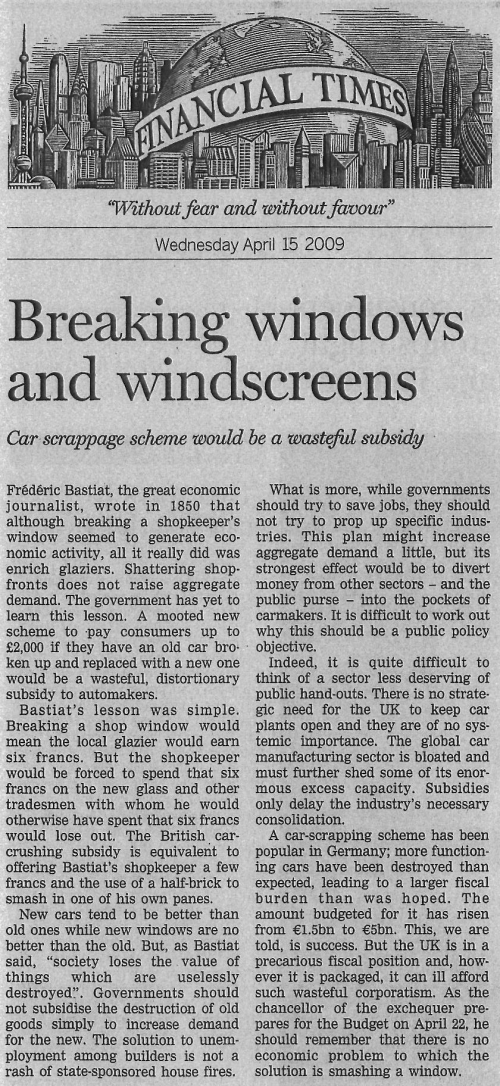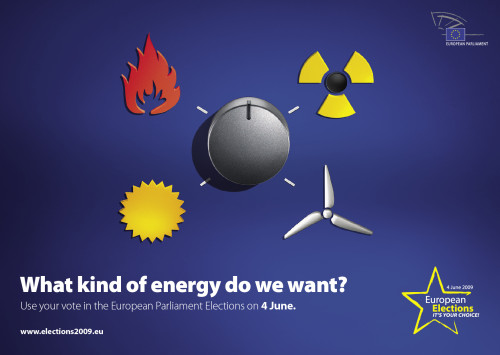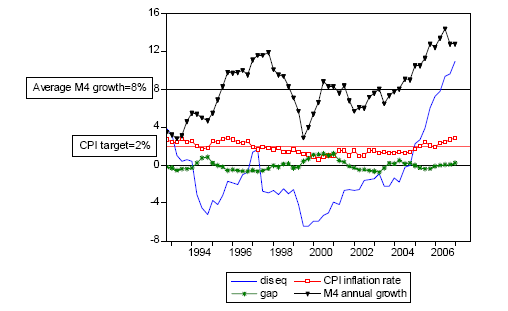I am a supporter of and enthusiast for the Institute of Economic Affairs (IEA), the leading free-market think-tank. So I was shocked to read, in what I think is the best post I have seen on Guido's site, that the IEA's Shadow Monetary Policy Committee (SMPC) are unanimously in favour of a policy of Quantitative Easing (QE).
The IEA was founded after Anthony Fisher sought the advice of Friedrich Hayek on what to do about the increasingly socialist trend of British politics after the war. Hayek advised him not to go into politics, but to try to change the intellectual climate, to fight the battle of ideas. So Fisher founded the IEA to fight this battle, recruiting Arthur Seldon and Ralph Harris as the thinker and persuader of his organisation, and with Hayek as a substantial intellectual influence.
Hayek was a leading figure in the Austrian school of economics (to which I adhere). Hayek and any self-respecting Austrian would be profoundly opposed to QE. The school believes in removing the power of governments to manipulate their currencies, whether through commitment to a genuine gold standard (as advocated by Hayek's mentor and my hero, Ludwig von Mises, and by Hayek himself originally), or through denationalising money and creating a system of competing currencies (as became Hayek's preferred option). The IEA published works by Hayek and others to this effect, and Seldon advocated the approach. In this, as in other respects, Austrian economics was a significant part of the IEA's challenge to the leftwards trend of politics in the UK, which ultimately came to fruition with the election of the Thatcher government in 1979.
It wasn't the only influence. Milton Friedman and the monetarist approach became increasingly influential on the IEA and on the Conservative Party. But Hayek and the Austrian school remained important influences on both groups. Which is why it is such a shock to find that the Hayekian view has been completely marginalized in the SMPC.
I know that the Hayekian perspective has not been marginalized in broader IEA circles (though it is somewhat embattled). So why is it not represented on the SMPC? The answer, it seems, is that it is increasingly hard to find economists in the UK who hold to the Austrian (or at least sound-money) view, particularly in the macro-economic, monetary-policy field. The sound-money tradition - the attitude that once distinguished us from our more profligate neighbours to north and south in Scotland and France* - has almost disappeared from British academic circles. In fact, I am told there are only two credible contenders - Kevin Dowd and Anthony Evans. I don't know why neither of them has been invited onto the SMPC, but it is admittedly a small pool compared to the massed ranks of monetarists.
Austrian economists have an excellent record of forecasting future outcomes. The approach avoids the unreal abstraction that causes many people to doubt the value and truth of economics. Its conclusions and lessons are more important than ever, and experience provides ever more illustrations of the failure of the leading mathematical, interventionist schools of economics - Keynesianism and monetarism, which actually have more in common with each other than do monetarism and Austrian-school economics. And yet British universities and academics have almost completely eliminated it from the syllabus. Why should that be?
It occurs to me that there is a good public-choice explanation for this. Public-choice theory is the name given to Buchanan and Tulloch's extension of economics into the political realm. Conventional political studies and socialist philosophy viewed policy-makers as well-intentioned, well-informed, altruists. They were interested only in doing right, and the challenge was merely to establish what was right. Buchanan and Tulloch pointed out that politicians and other public-sector employees are actually subject to economic forces in the same way that market participants are subject. For instance, they have powerful incentives to favour the short-term over the long-term and to favour activism over laissez-faire.
But economists, whether employed by universities, government departments, or in large commercial organisations, have similar incentives. Not many economists get hired for telling their potential employers that markets are unpredictable, uncontrollable and best left to their own devices.
Commercial organisations will want economists who can make cases why the government should intervene in their sector in a way that is advantageous to their employer, or how they can best manipulate their position in the market to maximise profits.
The civil service will not want its economists to tell politicians that their interventions are at best pointless and usually harmful, and that market corrections are necessary and good for the economy and should be allowed to play themselves out. The civil service will want economists who can draw up schemes that satisfy politicians' desire to be seen to be doing something about whatever issue arises.
Universities will want economists whose papers influence policy (and which are therefore, by definition, activist). They will want economists whose views and specialities maximise the chances of obtaining research grants.
Monetarists appear to have the answers. Their analysis and policy prescriptions can vie with the Keynesians and other neo-classical, mathematical schools for the favour of those who pay the bills.
Not so Austrians. Austrians reject the idea that policy can improve the outcome of markets, other than through the creation of an institutional framework that protects property rights and enables exchange. This is of no earthly use to rent-seeking businesses, vote-seeking politicians, or grant-seeking universities. So Austrians are gradually, over time, driven from these organisations. The very people who could have told banks that there is no such thing as a free lunch, governments that monetary, trade and budget imbalances eventually have to unwind, and universities that economics must be based on sound philosophy and not just mathematical models of scenarios where all the reality has been abstracted out, are not there to give this advice, because it is deeply inconvenient.
So Austrians must live in the real world. This is good for understanding how economies really work, rather than how they ought to work if only pesky humans could be more like the models predict. But it is bad for influencing policy, in a world where the value of your advice is not measured by the strength of the argument but by your station in life.
That is where organisations like the IEA should come in. Let's hope that they see sense and correct the bias towards monetarism on the SMPC. And let's hope against hope that some balance and philosophy can be miraculously restored to the study of economics in the UK. After all, haven't we just found out that the world doesn't work quite like Gordon's favourite - neo-classical endogenous growth theory - would expect?
I suggest that the IEA, to show that its heart is still in the right place, should publish a public-choice analysis of the incentives acting on the economics profession. But which economist would be brave enough to carry out the study?

 Fingers have been pointed in the direction of many different culprits for the critical condition of our economy. I am surprised that they have not been pointed more frequently at Sir Callum McCarthy. We don't need to swab him for gunshot residue; he is spattered in blood, holding a smoking gun.
Fingers have been pointed in the direction of many different culprits for the critical condition of our economy. I am surprised that they have not been pointed more frequently at Sir Callum McCarthy. We don't need to swab him for gunshot residue; he is spattered in blood, holding a smoking gun.





